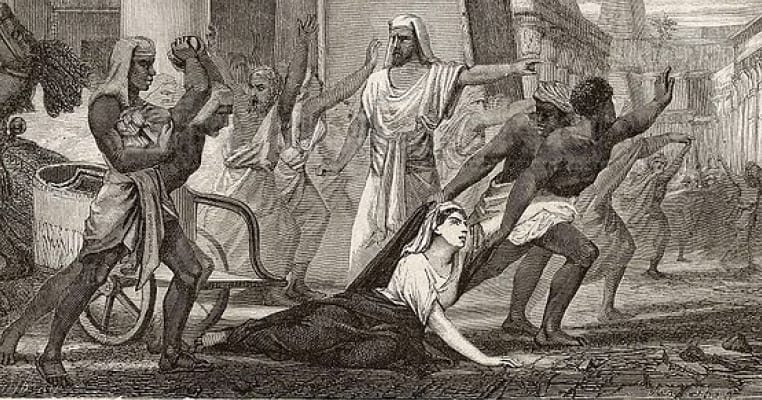In 415 AD, a most remarkable woman was murdered in the Egyptian city of Alexandria. Hypatia of Alexandria was a mathematician and philosopher, who despite the prevailing biases against her sex was held in the highest esteem by the learned men of the ancient city. Students flocked to listen to Hypatia lecture and to receive her instruction. In fact, the ruling elite of Alexandria so respected Hypatia’s wisdom; she even had the ear of the Roman governor of Egypt.
Alexandria had long been a city of culture and learning. However, by the fifth century AD, it was, like so much of the Roman Empire, a city riven by division. For although Christianity was now the official religion of both the eastern and western Empires, paganism continued to persist. In Alexandria in particular, sporadic outbursts of violence broke out between the different religious factions as they vied for influence in the city. Hypatia’s death sparked just one of these spates of rioting when Alexandria’s Christians were blamed for her murder. Envy seems to have been the motive. But envy of what: her influence as a woman, her religion and learning? Or was Hypatia’s death the result of something else entirely?

Hypatia: The Philosopher, Teacher, Mathematician- and Political Adviser
The exact date of Hypatia’s birth is not known. However, sources state she was ‘in her prime’ i.e., a fully matured adult, sometime between 395-408 AD, during the reign of the Emperor Arcadius. This description suggests that Hypatia was probably middle aged – even elderly at the time of her death. She may have been a prodigy. However, no young woman, however much a genius could have hoped to achieve the influence Hypatia is reputed to have enjoyed. Instead, it probably took Hypatia years to establish her exulted reputation- possibly longer than most men.
Her father, Theon of Alexandria, a respected philosopher and geometrician who was also the head of the University of Alexandria educated Hypatia. Hypatia’s thirst for learning proved insatiable, and she soon surpassed her father’s teachings. She began to study independently and theorize on other philosopher’s works. Although her writings are now lost, Hypatia is known to have written commentaries on Diophantus, the “father of algebra,” the works of the astronomer Kanon and the Conic Sections of Apollonius of Perga.
The sixth-century pagan writer Damascius claimed that Hypatia was the wife of the philosopher Isidorus- an impossibility since Isidorus was born long after Hypatia’s death. However, most sources agree that Hypatia remained single- and chaste. Many of the sources make a great deal of Hypatia’s physical beauty. However, for Hypatia at least, beauty had nothing to do with the flesh. One story tells how when one of her pupils fell in love with her, Hypatia suggested he might take his mind off his feelings by applying himself to his studies. When this did not work, however, Hypatia resorted to extreme measures.

Hypatia threw some of her stained ‘woman’s rags, ” at her young suitor to illustrate her imperfect nature. “This is what you are in love with, young man,” Hypatia told him as she threw the blood-stained cloth at him, “and not with the Beautiful.” To Hypatia, her female body was an irrelevance-perhaps even an inconvenience. Indeed, the sources describe how she put on “a man’s cloak”- in other words aped a male style of dress. By doing so, Hypatia was downplaying her sex, de-sexing herself even, so that she might be taken seriously as a scholar.
Acceptance as an intellectual was not something Hypatia could hope for if she conformed to the social norms for the women of her time. For women in the eastern empire,whether pagan or Christian, were supposed to take a secluded and subordinate role. They were certainly not supposed to give public lectures in the center of Alexandria on Plato and Aristotle. Hypatia transcended expectations of her sex and was not only tolerated but lauded. Her originality of mind led to her being described as surpassing “by far the philosophers of her time.” She was also a popular teacher with “people from all over who wanted to study philosophy” rushing “to her side.” So well-respected were Hypatia’s opinions that even the magistrates of Alexandria consulted her. Hypatia was an influential woman on many different levels. And that made her dangerous.

